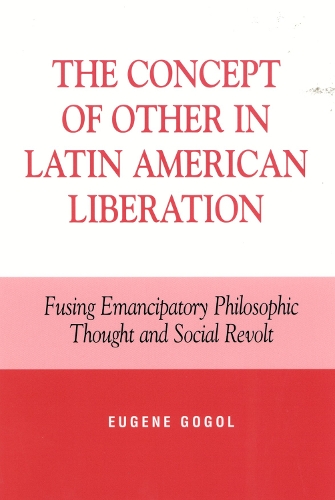
The Concept of Other in Latin American Liberation: Fusing Emancipatory Philosophic Thought and Social Revolt
(Paperback)
Publishing Details
The Concept of Other in Latin American Liberation: Fusing Emancipatory Philosophic Thought and Social Revolt
By (Author) Eugene Gogol
Bloomsbury Publishing PLC
Lexington Books
20th March 2002
United States
Classifications
Tertiary Education
Non Fiction
Philosophy
Social theory
100
Physical Properties
Paperback
395
Width 151mm, Height 230mm, Spine 30mm
599g
Description
In this exciting new study, Eugene Gogol interweaves three strands that form the intellectual bedrock for the concept of the Other in the Latin American context: Hegel's dialectic of negativity, Marx's humanism, and autochthonal emancipatory thought. From this foundation, the book explores the relation of liberatory philosophic thought to today's social and class movements. Gogol considers the logic of capitalism on Latin American soil, the ecological crisis in Latin America, and the concept and practice of self-liberation. Still one of the most contested terrains of Latin American thought, the Other has been of central concern for many luminary thinkers including Leopoldo Zea, Octavio Paz, and Jose Carlos Mariategui. While these writers may not garner much publicity in the world press, the highly public and ongoing struggles of the Zapatistas and Brazil's Landless Workers Movement demonstrate the continuing need to theorize the volatile nature of Latin American social reality.
Reviews
This will be an important work for people interested in contemporary Latin American thought and new social movements, as well as to philosophers seeking to relate their reflections to social reality, in general. It is certainly a welcome contribution to a scandalously neglected area: Latin American philosophical production. -- Eduardo Mendieta, Pennsylvania State University
Gogols work is a welcome reexamination of the relevance of Hegel and Marx for liberation, and it is a trenchant analysis of Latin American revolutionary thought as a necessary moment for human emancipation in a Hegelian-Marxist dialectic. The Concept of Other in Latin American Liberation is an important contribution for an understanding of Latin American philosophy. -- Mario Senz, Le Moyne College
This is a masterful study that interweaves Hegel's dialectic of negativity, Marx's humanism, and subjectivity in a strand of Latin American revolutionary thought together with case studies of social movements to create a Latin American philosophy of liberation. . . . It is an ambitious project in which Gogol is eager to engage intellectual trends of both the academic and organic kinds in order to chart a path toward liberation. -- Marc Becker, Truman State University * H-Latam *
A useful and intelligent study of the dialogue between Marxism and revolutionary practice in Latin America today. -- James Petras, SUNY-Binghamton
Author Bio
Eugene Gogol received his Ph.D. from UCLA. He is currently teaching in Oregon.
